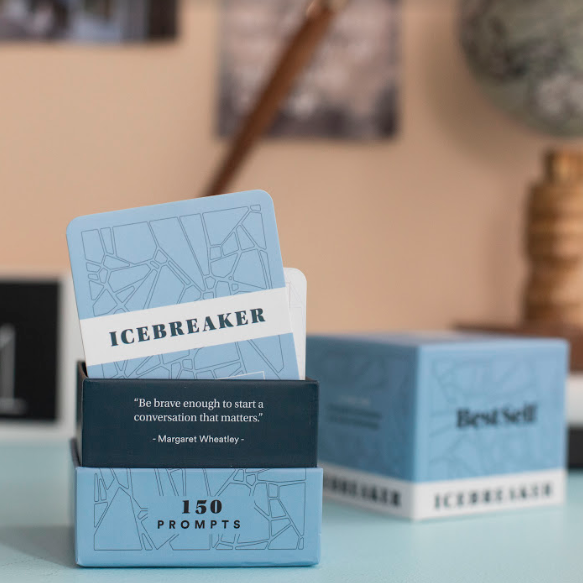- Home
- Games & Apps
- Conversation Games
The Best Conversation Games to Play with Friends and Family
Looking for ideas to get a group of people talking? Here are the best conversation games to spark enjoyable discussions and a few laughs with your loved ones.

Conversation games are some of the best games to play with a group of people.
They enable you to engage in meaningful conversations with your friends or family, in a calm and relaxed environment - while having an absolute blast.
Best of all, they usually require minimal or no equipment, so you can involve many as people you want!
Here is a list of top conversational games to play the next time you get a group of people together.
These games include questions and activities that challenge you to think outside the box, and may open up interesting facts about people that you never knew before!
This post may contain affiliate links. Please read my disclosure for more information.
10 Fun Conversation Games To Spark Engaging Discussions
Here are some fun and interactive talking games to include in your virtual or in-person social events:
1. BestSelf Icebreaker Game
The BestSelf Icebreaker game is one of my favourite conversation games of all time. If you're looking for interesting conversation starters for a party or gathering, I highly recommend it.
It's a deck of 150 cards that includes various questions that are designed to break down barriers and cultivate warmth and openness between people.
The questions are split across 6 categories, including: Deep, Would You Rather?, Experiences, If You Could, Life, Random.
Some sample questions include:
- What is something you are certain you'll never experience and why? (Deep)
- What's your most used emoji? (Random)
- Would you rather have a rewind or pause button on your life? (Would You Rather?)
- What's the first thing you remember buying with your own money? (Life)
- If you could switch places with one of your friends for a day, who would it be? (If You Could...)
- What's something you did as a child that your parents still retell the story about? (Experiences)
This game is a fun and non-awkward way to find out people's thoughts on topics that may not regularly come up in everyday conversation.
=> Get the BestSelf Icebreaker Deck on Amazon here.
2. Alphabet Game
Alphabet is a game that works well with a large group of people.
You pick a topic (e.g. insects) and as you go through the alphabet, each person in the group takes turns to name something that begins with that letter. For example, person 1 could say "ant", person 2 could say "bumble bee", etc.
You get kicked out of the game if you can't think of a word or if you pause for a long time, and the cycle continues from A-Z with the remaining participants.
The game ends when no one can think of a word for a particular letter.
You can also use more complex prompts such as:
- States or cities in a country
- Disney movies
- Languages
- Car manufacturers
Overall, this is a game that tests your creativity and response time.
3. Psychiatrist

How observant are you? Play a game of psychiatrist and find out...
First, organize a group of people so that one person is chosen as the “psychiatrist” while the others are the “patients.”
Have the psychiatrist leave the room (or send them to a Zoom breakout room).
In the meantime, the patients should decide on an "illness" or specific pattern that everyone will follow. For example, patients may decide that they will each pretend to be the person to their immediate left.
The psychiatrist then enters the room and questions patients one at a time to try and figure out the pattern.
If a patient answers incorrectly, the person they are pretending to be yells out “psychiatrist!" and everyone gets up and rearranges themselves (or turns their zoom cameras off and on). The pattern remains the same.
The game ends when the psychiatrist wins by correctly guessing the pattern. Then, the last person who spoke to the psychiatrist becomes the new psychiatrist.
Or, you can designate a time for the game, and if the pattern has not been guessed within that time frame - the patients win!
4. Telephone
Telephone is the classic game where players form a line or circle, and a short message is passed down the chain.
The first person comes up with a message, (preferably one that's easy to mishear, e.g. "The caterpillar crunched the candy so hard it cracked. ") and then whispers it into the ear of the second person. Each player then repeats the message to the person next to them.
Finally, the last person reveals what they heard to the rest of the group, and the first person reveals the original message.
The idea is that messages often get misinterpreted as they are passed on to multiple people, so the fun of the game is seeing how much the message has changed!
5. Find 10 Things in Common
Finding commonalities always creates a bonding experience.
In this conversational game, the group is challenged with the task of finding 10 things that everyone shares in common (besides the obvious human things, like two eyes).
If you have a really big group, you can make this game easier by dividing people up into smaller teams.
Who knows, you might discover that all your friends saw Justin Bieber as their first concert...
6. Just a Minute

Just a minute is a popular talking game that tends to get a good laugh out of people.
Each player must speak continuously for a minute on an assigned subject.
If you do this successfully the whole way, you get 1 point. If you hesitate, repeat yourself, or deviate, you get 0 points.
To make it less intimidating, you can also award 0.5 points for anything that falls somewhere in between.
This may sound easy - until you get asked to speak on an obscure topic that you know little to nothing about.
The idea of the game is to speak confidently, as though you know exactly what you're talking about, even if you don't have the slightest clue!
Sample topics:
- How to make a cup of tea
- The best way to propose to your boyfriend / girlfriend
- Wine tasting tips for beginners
- The advantages and disadvantages of social media
7. Two Truths and a Lie
Two Truths and a Lie is a game that will help you become more familiar with the people in the room that you don't know that well.
Each participant has to come up with two statements about themselves that are true, and one statement that's false.
Then, it's up to everyone else to try and identify the false statement that's lurking in between the truth.
I find that this game tends to generate interesting discussions about past experiences, especially when people share facts about themselves that no one could have ever imagined!
8. Who is Most Likely To?
Who is Most Likely To? is a conversation game that reveals what your friends really think about you.
You create a list of scenarios and read them aloud one by one, and the group must decide which individual is most likely to do the thing that's described.
For example: Who is most likely to...
- Win a Grammy?
- Go on a space mission?
- Get locked out of their vehicle?
- Go the longest without eating?
- Fall asleep in class?
- Join the secret service?
This game allows you to have fun teasing one another a little bit!
9. Hot Seat

If you're feeling particularly brave, hot seat is another game that gets people talking.
- The idea is that each participant takes turns being the center of attention for a round of questioning.
- Everyone in the group has to come up with a question to ask the person in the "hot seat".
The question can be about anything - the person's likes and dislikes, a hypothetical situation - or simply what they had for breakfast that morning.
This game is a great way to make sure that everyone feels involved. It's also an opportunity to ask that person the burning question that's been on your mind!
Just make sure the questions aren't too personal, so that everyone feels comfortable to participate.
Also, keep in mind that this game works best with small to medium groups, where each person in the hot seat gets asked up to 10 questions.
10. The Questions Game
Last but not least, the questions game.
Get ready for a mental exercise that will keep you on your toes.
In this two-player game, you are tasked with the challenge of answering someone's question with a question of your own.
The objective of the game is to see how long participants can maintain a dialogue of asking questions back and forth, without getting thrown off guard.
- The game begins when the first player serves by asking a question (e.g. "Would you like to play questions?").
- The second player must respond to the question with another question (e.g. "How do you play that?").
- Each player must quickly continue the conversation by using only questions.
Your opponent automatically wins if you hesitate or answer a question with a statement.
This game is highly entertaining - both for participants and for those who watch the madness unfold.
Frequently Asked Questions about Conversational Games

What are Some Fun Talking Games for Kids?
Talking games are a practical way to help kids break out of shy behaviours and start interacting with other kids - at school, at parties, or even on a play-date.
Here are a couple of games that get kids talking:
- Name 10: One kid decides on a category (e.g. candy) and the other kids try to come up with 10 items that fit in the category.
- Alphabet Name Game: Each kid takes turns adding a name and an item in alphabetical order. For example, "I am Amy and I like avocados", "I am Ben and I like bicycles, and so on. To step it up, get each child to recite the name before them.
What are the Best Conversation Games for Couples?
What better way to get to know your significant other than to play a conversation game? Set aside time to spend with your partner and explore topics and questions that draw you closer together.
Here are some discussion games you can play as a couple:
- Whisper Challenge: One person wears a pair of headphones with music playing at a volume high enough that they can’t hear anything. The other person then says a phrase, and the person with the headphones has to guess what was said.
- Who Knows Me Better? : Prepare a list of questions about yourself. Grab your significant other and another person that's close to you (e.g. a parent, sibling, best friend), and test them to see which person knows you better!
Many couples also enjoy discussing questions from the BestSelf Intimacy Deck, another set of conversation prompts designed specifically for couples.
Planning a Get-Together? Why You Should Include Games in Which People Can Talk

Hopefully you've discovered some ideas for games that you can play soon with your loved ones.
Why are conversation games so effective at social events?
Well, for one thing, since they don't involve many complex rules and pieces, these kinds of games are usually simple for everyone to understand and start playing right away.
Moreover, they ensure that you actually get to know the people you're with. So many games are fun in themselves, yet they can make you more focused on the game than on your company.
On the other hand, conversational games help you create stronger interpersonal connections, and they're a great way to break the ice with strangers and new acquaintances.
I personally love playing these games with friends and family, and I hope you get a kick out of them too!
Related:
Thanks for reading! If you liked this content, share with a friend:
Recent Articles
-
11 Best Gifts for Psychology Majors That Will Delight and Amuse
Dec 07, 25 01:46 PM
Looking for the perfect psychology-themed present for a college student or therapist? Here is a roundup of the best gifts for psychology majors. -
15 Best Gifts for High Maintenance Women and Self-Care Queens
Nov 24, 25 06:49 PM
What do you buy a lady who is already accustomed to a lavish lifestyle? Here are ideal gifts for high maintenance women who never settle for less than the best. -
5 Signs You’re in a Creative Incubation Phase (Not a Rut)
Nov 11, 25 07:51 PM
Feeling uninspired? What if this pause is actually part of the process...Here are signs that you're in a creative incubation phase and good things are coming.








